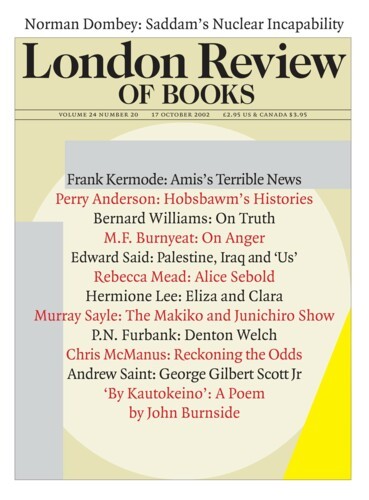It is possible to love football without loving the culture of the English Premiership. The waves of cash that have rolled into the game since the deal with Sky in 1991 may not have fundamentally altered the character of the sport – a quarter of a century ago, Tom Stoppard was making a character in his play Professional Foul complain about the ‘yob ethics’ of the game – but they have made it worse. The players are richer, greedier and nastier, and almost mystically free from any sense of wider perspectives and responsibilities.
If there were any doubt about that, the publication of Keane (Michael Joseph, £17.99), the autobiography of the Manchester United player, ghost-written by the footballer-turned-journalist Eamon Dunphy, would clear it up. The book has already been all over the newspapers, for a passage concerning Keane’s feud with Manchester City’s Alf-Inge Haaland. Keane’s big grievance against Haaland was based on the fact that, in the course of an earlier attempt to injure Haaland, in 1997, Keane had snapped his own cruciate ligament and been out of the game for months. By and large, the more in the wrong we are, the more angry it makes us, so here was how Keane got his revenge, in April 2001: ‘I’d waited almost 180 minutes for Alfie, three years if you looked at it another way. Now he had the ball on the far touchline. Alfie was taking the piss. I’d waited long enough. I fucking hit him hard. The ball was there (I think). Take that, you cunt.’
Haaland has not started a game for Man City in the 18 months since the injury, and has played only 48 minutes of football. This passage from Keane violates one of football’s central taboos. It is part of the supposed code of professionals that they never deliberately attempt to injure each other – the game would disintegrate if they began to do so. Keane has been accused of ‘bringing the game into disrepute’, the catch-all eunuchoid charge levelled by the Football Association, and is also facing legal action from City and Haaland. In fact, his words look to me like an admission of assault, and it is strange that the lawyers allowed him to print it; perhaps they were more concerned with the possibility of Keane’s libelling other people, and didn’t notice that here he was in effect libelling himself. Still, the fact that Dunphy ghost-wrote the book will offer useful wiggle room. He has already spoken about ‘artistic licence’.
In 1979 Dunphy, in his day a skilled midfield player for Millwall and Ireland, published one of the best books ever about football, giving the pro’s-eye-view in Only a Game? Part of what was startling about the book was its desolateness, its apparent lack of pleasure in anything to do with the sport. Keane is like that, but more so. The only joys are those of winning. Even what should be the most gripping part of the book, describing Keane’s walk-out from the Irish World Cup team in Korea, is a disappointment. According to Keane, the culminating diatribe to Mick McCarthy went as follows: ‘You’re a fucking wanker. I didn’t rate you as a player, I don’t rate you as a manager, and I don’t rate you as a person. You’re a fucking wanker and you can stick your World Cup up your arse. I’ve got no respect for you.’ This is nowhere near as sublime as the version that was given at the time: ‘You were a crap player and you’re a crap manager. You’re not even Irish, you English cunt. You can stick it up your bollocks.’ So both versions have Keane using an obscene oxymoron, the disagreement being whether it was ‘fucking wanker’ or ‘stick it up your bollocks’. Interesting. But not very.
On its publication Keane went straight to the top of the bestseller list. Another book certain to do that is the Diaries of Edwina Currie (Little, Brown, £18.99). An earlier publicity coup of Currie’s involved splitting up with her husband at the same time as she published a novel called She’s Leaving Home. Anyone who might have thought that was a bit shameless will have to recalibrate their sense of these things, since Currie’s spectacular act of vengeance and indiscretion in regard to her four-year affair with John Major. A lot of coverage has been devoted to the question ‘what if we had known?’ But the main thing that would have been different is that people would have been denied the pleasure they feel at finding out about it now.
The recent appearance of comparable memoirs in France led commentators to denigrate the appearance of a genre that had previously been a British speciality: ‘butler’s lit’, they called it. (There, the books in question included one by Jacques Chirac’s chauffeur chronicling the President’s activities as a coureur, with the unflattering observation from a former girlfriend: ‘Chirac? Three minutes, including the shower.’) Perhaps the genre has thrived in Britain simply because, ever since the Duke of Wellington told his mistress to ‘publish and be damned,’ nobody has ever gone broke overestimating the prurience of the great British public. Anyone who feels strong enough should check out the opening page of Edwina Currie’s website, which features a picture of our heroine lying on a sofa in a red dress slit to reveal most of her leg. To get past that you have to click ‘Enter . . .’
Send Letters To:
The Editor
London Review of Books,
28 Little Russell Street
London, WC1A 2HN
letters@lrb.co.uk
Please include name, address, and a telephone number.

